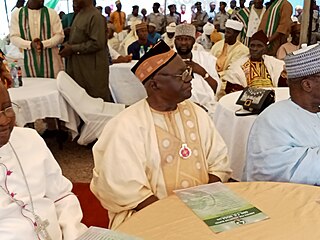Abubakar Dangiwa Umar was governor of Kaduna state in Nigeria from August 1985 to June 1988 during the military regime of General Ibrahim Babangida. After retiring from the army in 1993,he became a social critic and the founder of Movement for Unity and Progress,a political party.

Hassan Usman Katsina,titled Chiroman Katsina,was a Nigerian general who was the last Governor of Northern Nigeria. He served as Chief of Army Staff during the Nigerian Civil War and later became the Deputy Chief of Staff,Supreme Headquarters.
Ibrahim Taiwo was a Military Governor of Kwara State from July 1975 to February 1976 during the military regime of General Murtala Mohammed. He assisted in establishment of the University of Ilorin,which was founded by decree August,1975.

Colonel Datti Sadiq Abubakar was Military Governor of Anambra State in Nigeria from July 1978 to October 1979 during the military regime of General Olusegun Obasanjo.
Umaru Mohammed was appointed Governor of North-Western State in Nigeria in July 1975 at the start of the military regime of General Murtala Mohammed. In February 1976 North-Western State was split into Niger State and Sokoto State. Umaru Mohammed continued as Governor of Sokoto State until July 1978.
Garba Duba was a Nigerian Army Lieutenant general who was Governor of Bauchi State,Nigeria from July 1978 to October 1979 during the military regime of General Olusegun Obasanjo,and Administrator of Sokoto State from January 1984 to August 1985 during the military regime of Major General Muhammadu Buhari.
Mohammed Sani Sami was Governor of Bauchi State,Nigeria from January 1984 to August 1985 during the military regime of Major General Muhammadu Buhari.

Zamani Lekwot is a retired Nigerian Army major general who served as the military governor of Rivers State,Nigeria from July 1975 until July 1978 during the military administrations of Generals Murtala Muhammed and Olusegun Obasanjo.
Mohammed Chris Alli was a Nigerian Army major general who served as Chief of Army Staff from 1993 to 1994 under General Sani Abacha's regime and was military governor of Plateau State Nigeria from August 1985 to 1986 during the military regime of General Ibrahim Babangida. Many years later,he was appointed interim administrator of the state during a 2004 crisis in the state following ethno-religious killings in Shendam,Yelwa Local Government.
Joshua Mamman Madaki was Governor of Bauchi State,Nigeria from December 1987 to August 1990 and then of Plateau State from August 1990 to January 1992 during the military regime of Major General Ibrahim Babangida.
Colonel Anthony Aboki Ochefu was a Military Governor of East Central State from July 1975 to February 1976 during the military regime of General Murtala Mohammed.

Hamza Abdullahi was a Nigerian statesman and military administrator who served as Governor of Kano State from 1984 to 1985;and Minister of the Federal Capital Territory from 1986 to 1989.
Chief Akintunde Aduwo is a retired Nigerian Navy Vice Admiral who served as Chief of Naval Staff from 1980 to 1983 and as military governor of the Nigerian Western State from July 1975 to August 1975 during the military regime of General Murtala Muhammed.
Patrick Aziza was the first military Governor of Kebbi State,Nigeria after it was split off from Sokoto State on 27 August 1991 during the military regime of General Ibrahim Babangida.
John Yahaya Madaki (?–2018) was military governor of Katsina State,Nigeria in December 1989,during the military regime of General Ibrahim Babangida. He handed over to the elected civilian governor Saidu Barda in January 1992 at the start of the Nigerian Third Republic.
Joseph Akahan was a Nigerian military officer and Chief of Army Staff (Nigeria) from May 1967 until May 1968,when he was killed in a helicopter crash during the Nigerian Civil War.
Salihu Ibrahim FSS,FHWC was a Nigerian army general who was Chief of Army Staff from August 1990 until September 1993 during the military regime of General Ibrahim Babangida.

Mohammed Shuwa was a Nigerian Major General and the first General Officer Commanding of the Nigerian Army's 1st Division. Shuwa commanded the Nigerian Army's 1st Division during the Nigerian Civil War. He was murdered in Maiduguri by suspected Boko Haram sect on 2 November 2012.

The 1990 Nigerian coup d'état attempt was a military coup attempt which took place in Nigeria on 22 April 1990 when a faction of Armed Forces officers,led by Major Gideon Orkar,attempted to overthrow the government of General Ibrahim Babangida. Rebel troops seized the FRCN radio station and various military posts around Lagos,including the military headquarters and presidential residence,the Dodan Barracks. Babangida was present when the barracks were attacked but managed to escape by a back route. In the coup address,Orkar called for the excision of five northern states of Nigeria,he accused Babangida of planning to install himself as Nigeria's life president,accused the Federal Military Government of marginalization of the people of Niger Delta and the entire Southern part of the country.

Musa Bityong,also Musa Bitiyong was a lieutenant colonel in the Nigerian Army,executed by firinɡsquad by the ɡovernment of Gen. Ibrahim Babanɡida in 1986,alonɡside Maj. Gen. Mamman Vatsa and eiɡht others,suspected of conspiracy to commit treason aɡainst the reɡime.






